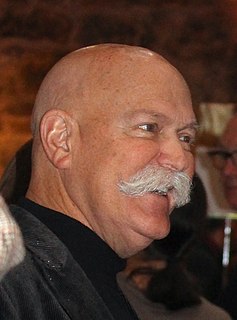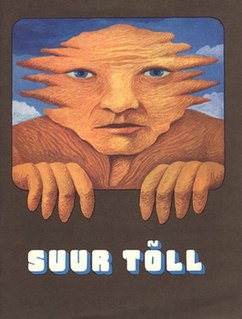Related Research Articles

William Gale Vinton was an American animator and filmmaker. Vinton was best known for his Claymation work, alongside creating iconic characters such as The California Raisins. He won an Oscar for his work alongside several Emmy Awards and Clio Awards for his studio's work.

Priit Pärn is an Estonian cartoonist and animation director whose films have enjoyed success among critics as well as the public at various film festivals.
Fyodor Savelyevich Khitruk was a Soviet and Russian animator and animation director.
John Hubley was an American animation director, art director, producer and writer of traditional animation films known for both his formal experimentation and for his emotional realism which stemmed from his tendency to cast his own children as voice actors in his films.
Yoshifumi Kondō was a Japanese animator who worked for Studio Ghibli in his last years. He was born in Gosen, Niigata Prefecture, Japan. He worked as an animation director on Anne of Green Gables, Sherlock Hound, Kiki's Delivery Service, Only Yesterday and Princess Mononoke. Kondō directed the animated film Whisper of the Heart, and was expected to become one of the top directors at Studio Ghibli, alongside Hayao Miyazaki and Isao Takahata, and to become their eventual successor.
Philip Roman is an American animator and the director of the Peanuts and Garfield animated specials, as well as working on television shows such as producing animation for The Simpsons. He is the founder of animation studios Film Roman and Phil Roman Entertainment.

Roland Frederick Godfrey MBE, known as Bob Godfrey, was an English animator whose career spanned more than fifty years. He is probably best known for the children's cartoon series Roobarb (1974–75), Noah and Nelly in... SkylArk (1976–77) and Henry's Cat (1983–95) and for the Trio chocolate biscuit advertisements shown in the UK during the early 1980s. However, he also produced a BAFTA and Academy award-winning short film Great (1975), a humorous biography of Isambard Kingdom Brunel. Further Academy Awards nominations received were for Kama Sutra Rides Again (1971), Dream Doll (1979), with Zlatko Grgic, and Small Talk (1994) with animator Kevin Baldwin.
Ernest Pintoff was an American film and television director, screenwriter and film producer.

Noureddin Zarrinkelk is an Iranian animator, concept artist, editor, graphic designer, illustrator, layout artist, photographer, script writer and sculptor.
Tallinnfilm is the oldest surviving film studio in Estonia. It was founded as Estonian Culture Film in 1931, and was nationalized in 1940 after Estonia was forced into the Soviet Union. During the first year of Soviet Occupation (1940–1941) Eesti Kultuurfilm was taken over by the Communist Party and renamed Kinokroonika Eesti Stuudio. In 1942 during the German occupation the studio was renamed Kinokroonika Tallinna Stuudio and then renamed again as Tallinna Kinostuudio in 1947 by the Soviets. The Tallinn Film Studio was renamed Kunstiliste ja Kroonikafilmide Tallinna Kinostuudio in 1954 and in 1963 was renamed again Tallinnfilm.

The Adventures of Juku The Dog (1931) is the first Estonian experimental animated short film, written and directed by Voldemar Päts, produced by Aleksaner Teppor and animation by cartoonist Elmar Jaanimägi. For the film about 5000 drawings were made. Out of the total of 180 meters of shot film stock about 100m have survived. The soundtrack for the silent film was provided by Records of the Tormolen Co. Parlophon. In total 2 films in the series were attempted, the second one called The Adventures of Juku on Earth and Water was not completed and has not survived.
William Charles Littlejohn was an American animator and union organizer. Littlejohn worked on animated shorts and features in the 1930s through to the 1990s. His notable works include the Tom and Jerry shorts, Peanuts television specials, the Oscar-winning short, The Hole (1962), and the Oscar-nominated A Doonesbury Special (1977). He was inducted into the Cartoon Hall of Fame and received the Winsor McCay Award and garnered lifetime achievement awards from the Annie Awards and the UCLA Film and Television Archive. Director Michael Sporn has called Littlejohn "an animation 'God'."
Martti Soosaar was an Estonian journalist and writer.

Suur Tõll is a Soviet-era Estonian animated movie created by Tallinnfilm in 1980. The film was directed by Rein Raamat, and the main artist was Jüri Arrak.
Estonian animation tradition dates back to the 1930s when the first experimental films were made. The only surviving short film from the era is Kutsu-Juku seiklusi (1931). After the Great Depression, World War II, and Soviet Occupation interrupted its development, Estonian animation was reborn in 1958. Elbert Tuganov founded a puppet film division Nukufilm in Tallinnfilm Studio. The first film was titled Peetrikese unenägu based on a Danish writer Jens Sigsgaard's children story Palle alene i verden. Joonisfilm an 2D and 3D animation division of Tallinnfilm was founded by Rein Raamat in 1971. Films like Põld (1978), nominee for Golden Palm at the Cannes Film Festival in 1979; Lend (1973), the winner of Special Jury Award at the Zagreb World Festival of Animated Films; the Suur Tõll (1980), 2nd place at Ottawa International Animation Festival in 1982 and Põrgu (Hell) (1983), the winner of FIPRESCI Prize and Special Jury Award at the Annecy International Animated Film Festival made Raamat the first internationally recognized Estonian animation director.
The following are lists of animated films.

Eduard Vasilievich Nazarov was a Soviet and Russian animator, screenwriter, voice actor, book illustrator and educator, artistic director at the Pilot Studio (2007–2016), vice-president of ASIFA (1987–1999) and a co-president of the KROK International Animated Films Festival. He was awarded People's Artist of Russia in 2012.
Boris Pavlovich Stepantsev was a Soviet and Russian animation director, animator, artist and book illustrator, as well as a vice-president of ASIFA (1972–1982) and creative director of the Multtelefilm animation department of the Studio Ekran (1980–1983). Honored Artist of the RSFSR (1972).
Gennady Mikhailovich Sokolsky was a Soviet and Russian artist, animation director, animator, art director and screenwriter at Soyuzmultfilm. Sokolsky took part in over 170 projects, including the Happy Merry-Go-Round animated series which he co-created with several friends. Member of ASIFA.

Bhimsain was an Indian film director, producer, screenwriter and animator. He is best known as the pioneer of Indian animation, along with his mentor Ram Mohan. He was the recipient of 16 President's National Awards for his contributions to Indian cinema.
References
- 1 2 Animation journal, Volumes 7-8. AJ Press. 1998. p. 10.
- ↑ Connor, Kevin O' (2006). Culture and customs of the Baltic states. Greenwood Publishing Group. p. 163. ISBN 0-313-33125-1.
- 1 2 3 "Rein Raamat tiris eestlased joonisfilmi juurde". Extract from Postimees. March 20, 2006. Archived from the original on July 20, 2011. Retrieved December 11, 2010.
- ↑ "Joonisfilmi seemendaja". Postimees . 16 Feb 2011.